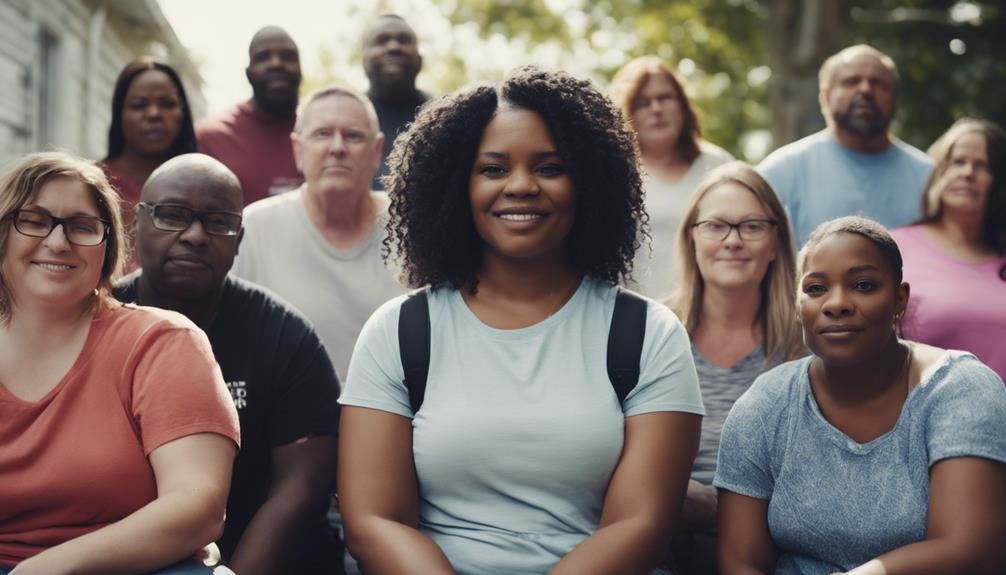If you’re seeking the best support services for domestic abuse recovery, turn to Crisis Intervention Services for immediate help and safety planning. Utilize Safety Planning Programs for personalized protection strategies and guidance on leaving abusive relationships. Seek refuge in Emergency Shelter Options offering confidential housing and legal advocacy. Embrace Personalized Safety Plans tailored to empower you and navigate challenges. Find solace in Support Groups for Survivors and Community Outreach Initiatives raising awareness and provide essential support. These resources are crucial on your journey to healing and safety.
Key Takeaways
- Crisis Intervention Services offer immediate support and emotional assistance 24/7.
- Safety Planning Programs provide personalized plans for protection and leaving abusive relationships.
- Emergency Shelter Options offer secure housing with legal advocacy and counseling services.
- Personalized Safety Plans include steps for protection and empower survivors to seek help.
- Support Groups for Survivors provide understanding, solidarity, and necessary resources during the healing journey.
Crisis Intervention Services
In times of crisis, seeking support from dedicated professionals can be essential for managing domestic abuse situations. Domestic violence can create emergency situations where safety planning becomes vital. That’s where crisis intervention services step in to provide immediate support and assistance.
Trained professionals offer a compassionate ear to listen, emotional support to help you cope, and practical safety planning to navigate through the turmoil.
During moments of crisis, having access to these services can make a significant difference in ensuring your safety and well-being. Crisis intervention services are available 24/7, ready to address urgent needs promptly.
Whether through hotlines, shelters, or support centers, help is just a phone call away. These professionals can guide you through the steps to take, connect you with necessary resources, and empower you to make decisions that prioritize your safety and recovery.
Safety Planning Programs
When facing domestic abuse, safety planning programs can be an essential lifeline. They help you identify emergency shelter options, create personalized safety plans tailored to your needs, and connect you with valuable community resources.
These programs empower you to take proactive steps to safeguard yourself during times of crisis and provide a supportive network as you navigate your journey toward safety and healing.
Emergency Shelter Options
For individuals experiencing domestic abuse and seeking immediate safety, emergency shelter options provide an essential lifeline for protection and support. These domestic violence programs offer confidential and secure temporary housing for survivors in crisis. Safety planning is a critical component of these services, ensuring that individuals can escape dangerous situations and access the resources they need to rebuild their lives.
Emergency shelter programs prioritize confidentiality to safeguard survivors and their children from further harm. They offer a range of services, including crisis intervention, legal advocacy, counseling, and support groups, tailored to meet the diverse needs of those fleeing abuse. By providing a safe and supportive environment, these programs empower survivors to take the first step towards healing and independence.
If you or someone you know is in immediate danger due to domestic abuse, reaching out to an emergency shelter can be an essential step towards safety and recovery. Remember, help is available, and you deserve to live free from violence.
Personalized Safety Plans
Creating a personalized safety plan is an essential step in ensuring your safety and well-being if you’re experiencing domestic abuse. These safety plans are tailored to help survivors navigate the challenges of an abusive relationship by identifying safety areas, risks in their homes, and strategies for protection.
In these programs, you’ll find guidance on safeguarding yourself during instances of physical abuse, ensuring the safety of children, and having quick access to emergency contacts.
Moreover, personalized safety plans provide vital steps for leaving an abusive relationship, such as gathering important documents, finding a secure location, and changing contact information to maintain confidentiality. They also empower survivors to seek help, access essential services, and understand the legal resources available for their protection and recovery journey.
Community Resources Available
In addition to utilizing community resources available through safety planning programs, individuals impacted by domestic abuse can access essential support and assistance. These programs offer a range of services including crisis intervention, emergency shelter, legal advocacy, counseling, and support groups tailored to meet the diverse needs of survivors.
Family members, including children, receive specialized care and support to navigate the challenges stemming from domestic abuse. Local domestic violence programs conduct extensive community outreach initiatives, such as awareness campaigns and workshops, to educate and empower individuals.
Survivors seeking legal assistance can access services for protective orders, court accompaniment, and legal representation, ensuring their rights are upheld. Additionally, these programs also provide valuable resources on technology safety, offering guidance on safeguarding privacy and protecting against technology-facilitated abuse.
Emergency Shelter Facilities

Emergency shelter facilities offer an essential lifeline for individuals impacted by domestic abuse, providing a safe haven and essential support services 24/7. These shelters are designed to offer survivors of domestic violence temporary housing and inclusive services to help them rebuild their lives. Within these facilities, survivors and their children have access to a secure environment, crisis intervention, safety planning, counseling, and support groups.
The trauma-informed care provided guarantees that survivors receive the emotional and psychological support they need during their stay. Additionally, services like legal advocacy, assistance with protective orders, court accompaniment, and referrals to pro bono services are available to help survivors navigate the legal aspects of their situation.
Additionally, emergency shelters offer child-friendly spaces, educational programs, and support for non-abusing parents, creating a holistic approach to healing and empowerment for those seeking refuge from domestic violence.
Legal Advocacy Assistance
How can legal advocacy assistance empower survivors of domestic abuse to navigate the complexities of the legal system and secure their rights and protection?
Legal advocacy assistance plays an essential role in supporting survivors through various services such as obtaining protective orders, court accompaniment, and guidance on survivors’ legal rights.
By offering referrals to pro bono legal services and explaining legal options clearly, advocates help survivors make informed decisions during challenging times.
Securing protective orders is an important aspect of legal advocacy as it provides survivors with legal safeguards against further abuse.
Additionally, court accompaniment services not only offer emotional support but also ensure survivors feel supported and understood during legal proceedings related to domestic violence cases.
Through legal advocacy assistance, survivors can gain the necessary tools and knowledge to navigate the legal system effectively, ultimately empowering them to seek justice, protection, and a path towards recovery.
Trauma-Informed Counseling

Trauma-informed counseling is an essential approach focused on understanding and addressing the impact of trauma on individuals who’ve experienced domestic abuse. When seeking support after such harrowing experiences, turning to trauma-informed counselors at a family violence center or through resources like the National Domestic Violence Hotline can provide a safe space for healing. These professionals are trained to recognize signs of trauma and offer specialized care tailored to survivors’ needs.
In these counseling sessions, the emphasis lies on creating a sense of safety, building trust, empowering survivors, and fostering collaboration in the healing journey. By working with trauma-informed counselors, survivors can develop coping strategies, build resilience, and navigate through complex emotions in a supportive environment. Evidence-based therapies such as cognitive-behavioral therapy (CBT) or eye movement desensitization and reprocessing (EMDR) may also be integrated to address trauma symptoms effectively.
If you or someone you know is on the path to recovery from domestic abuse, trauma-informed counseling can be an essential step towards healing and reclaiming a sense of well-being.
Support Groups for Survivors
Support groups for survivors provide an essential network of understanding and solidarity during the healing journey from domestic abuse. These groups offer a safe space where individuals can connect with others who’ve experienced similar challenges, fostering a sense of community and empowerment.
Trained advocates often facilitate these support groups, ensuring that participants receive the resources to help them navigate their healing process effectively.
Community Outreach Initiatives

Community outreach initiatives play an essential role in raising awareness and providing support for individuals affected by domestic abuse. These programs encompass a range of activities, from awareness campaigns to educational workshops aimed at preventing and addressing domestic abuse. They collaborate with local organizations, offering resource fairs and important services like safety planning, legal assistance, and counseling for victims and survivors.
Community outreach programs are fundamental in providing information on crisis intervention and legal advocacy, empowering individuals to seek help and navigate the complexities of escaping abusive situations. Additionally, these initiatives extend support to children impacted by domestic abuse, offering trauma-informed care, counseling services, educational programs, and safe spaces.
Legal assistance is a key component, aiding survivors with protective orders, court accompaniment, legal representation, and referrals to pro bono services. Through community outreach, a network of support and resources is established, ensuring that those affected by domestic abuse receive the assistance they need to heal and rebuild their lives.
Frequently Asked Questions
What Mental Illness Is Often Associated With Domestic Violence?
PTSD, anxiety, depression, and trauma response are often linked to domestic violence. Seeking help and support is essential. Remember, you deserve care and understanding as you navigate these challenging experiences. You are not alone.
Conclusion
To sum up, seeking support services for domestic abuse recovery is like planting seeds in fertile soil – with nurturing care, healing and growth are possible.
Remember, you aren’t alone in this journey. Reach out to crisis intervention services, shelters, counseling, and support groups for the guidance and support you deserve.
Your strength and resilience will blossom like a beautiful flower, even in the darkest of times. Take that first step towards healing today.







